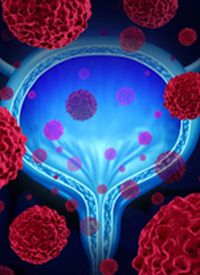Article
Potential Biomarkers of Response Identified for Enfortumab Vedotin in Advanced Urothelial Cancer
Author(s):
Tumor mutational burden and alterations in CDKN2A, CDKN2B, and MTAP were among several biomarkers that were predictive of response to enfortumab vedotin in patients with advanced urothelial carcinoma, according to findings from a retrospective analysis.

Tumor mutational burden (TMB) and alterations in CDKN2A, CDKN2B, and MTAP were among several biomarkers that were predictive of response to enfortumab vedotin-ejfv (Padcev) in patients with advanced urothelial carcinoma, according to findings from a retrospective analysis that were presented at the 2023 Genitourinary Cancers Symposium.
Enfortumab vedotin is an antibody drug conjugate that targets Nectin-4 and is widely used to treat patients with treatment-refractory advanced urothelial carcinoma. Despite its wide use in this patient population, data are limited regarding biomarkers to predict outcomes with this therapy.
Researchers analyzed data from the Urothelial Cancer Network to Investigate Therapeutic Experiences (UNITE) database, particularly of 170 patients (median age, 70; 78% men) from 16 sites with available next-generation sequencing. In addition, patients in this analysis were treated with enfortumab vedotin alone outside of a clinical trial setting.
Investigators determined observed response to enfortumab vedotin in patients with scans after one or more doses of the therapy. Several molecular biomarkers were assessed including TMB, somatic alterations in at least 10% of patients, PD-L1 status and the presence of one or more DNA damage response mutations.
Other factors that were assessed in this study include median progression-free survival, overall response rates and overall survival.
Of the patients in this study, 65% had pure urothelial histology, 69% had a primary bladder tumor and 68% had two or more lines of therapy before receiving treatment with enfortumab vedotin.
The overall response rate for patients was 47%. Of note, overall response rates were higher in patients with specific alterations compared with wild type including ERBB2 (67% vs. 44%; P = .05) and TSC1 (68% vs. 25%; P = .04).
Patients in the study had a median progression-free survival of 6 months and a median overall survival of 12 months. Shorter progression-free survival times were observed in patients with CDKN2A (HR = 1.7; 95% CI, 1.1-2.8), CDKN2B (HR = 2; 95% CI, 1.2-3.4) and MTAP alterations (HR = 1.3; 95% CI, 0.7-2.6). Patients with high TMB had longer median overall survival (HR = 0.4; 95% CI, 0.2-0.9).
“Upon external validation, these findings can help inform clinical decision making and potential therapy sequencing in patients with advanced urothelial carcinoma,” the researchers wrote in the abstract.
Reference
Jindal T, Kilari D, Alhalabi O, et al. Biomarkers of response to enfortumab vedotin (EV) in patients (pts) with advanced urothelial carcinoma (aUC): Analysis of the UNITE study. Presented at: 2023 ASCO GU Cancers Symposium; February 16-18, 2023; San Francisco. Abstract #450.









